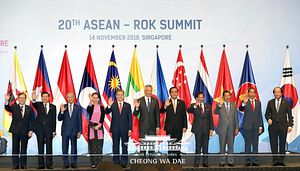Next week, South Korea will hold a series of high-profile events in its relations with Southeast Asia. The events will mark a huge week for both South Korea’s ties with Southeast Asia and South Korean President Moon Jae-in’s outreach to middle powers in the Asia-Pacific with his New Southern Policy.
As I have noted before in these pages, while South Korea’s interest in Southeast Asia and ASEAN is far from new – Seoul has long been a leading economic partner and a recognized Asian middle power – one of Moon’s expressed priorities since coming to office was to increase South Korea’s focus on Southeast Asia and ASEAN still further, partly under the broader banner of the so-called New Southern Policy. And while it is still early days in this initiative, we have seen some efforts to translate this into reality, be it the upgrading of ties with countries such as Indonesia, the elevated focus on the Mekong subregion, or the setting up of an ASEAN Culture House to spotlight the wide range of links between the two sides. Moon himself has been personally invested in this, as evidenced by his visiting all 10 ASEAN countries since he took office.
Next week will mark a key inflection point in both the Moon administration’s approach to Southeast Asia and its foreign policy more generally. As scheduled and after months of buildup, we will see an intense round of summitry tied to ASEAN-South Korea relations. Of particular note will be the 2019 ASEAN-Republic of Korea Commemorative Summit – which caps a series of developments to mark the 30th anniversary of the ASEAN-ROK relationship more generally – and the first-ever Mekong-ROK Summit, which will spotlight the Moon administration’s greater focus on mainland Southeast Asia in particular. Both summits will be held between November 25-27.
The week itself will be rich in symbolism. The active week of summitry will be held in Moon’s hometown in Busan, spotlighting the personal importance he has placed in the advancement of ties with Southeast Asia. Apart from the high-level diplomatic meetings, there are various activities – some already ongoing – that will illustrate various aspects of ties, including a film festival, a food fest, and art exhibitions. And in a display of the scale of the engagement, South Korean Foreign Minister Kang Kyung-wha told The Korea Times in an interview that this was “the biggest diplomatic event to be hosted by the South Korean government under the Moon Jae-in administration.”
Amid the abundance of symbolism, it will be important to assess what substantive developments will come out of next week across the three pillars that Moon has set out in the New Southern Policy – people, prosperity, and peace. Based on the specifics that have been publicly disclosed so far, we are likely to see a well-rounded agenda spotlighting aspects of security, economic, and people-to-people ties, and an attention to not just ASEAN-wide relations but also upgrading ties with key countries such as Vietnam, which will chair ASEAN next year. In an op-ed in The Straits Times ahead of the engagements published on November 18, Moon himself highlighted some of the functional areas of ASEAN-ROK collaboration where we may see progress, including infrastructure, smart cities, environmental sustainability, and small- and medium-sized enterprises. He also made reference to areas of wider geopolitical convergence, including between ASEAN’s Indo-Pacific Outlook and South Korea’s New Southern Policy.
To be sure, this round of upcoming summitry will not in and of itself remove the lingering challenges and outstanding questions that remain for ASEAN-South Korea relations and Moon’s approach to the region, whether it be how to navigate the more contested operating environment in mainland Southeast Asia that Seoul faces with China’s rising influence and governance issues, or making inroads on some of the other aspects of ties where we have not seen as much progress relatively speaking, including the security domain. And as we move past the 30th anniversary of ASEAN-South Korea relations in 2019, the focus will shift to the extent to which the Moon administration will be able to keep the momentum in its ties with Southeast Asia beyond this year. Nonetheless, the coming big week for ASEAN-South Korea relations will spotlight an aspect of South Korea’s foreign policy that is worth monitoring in the months and years that follow.
































